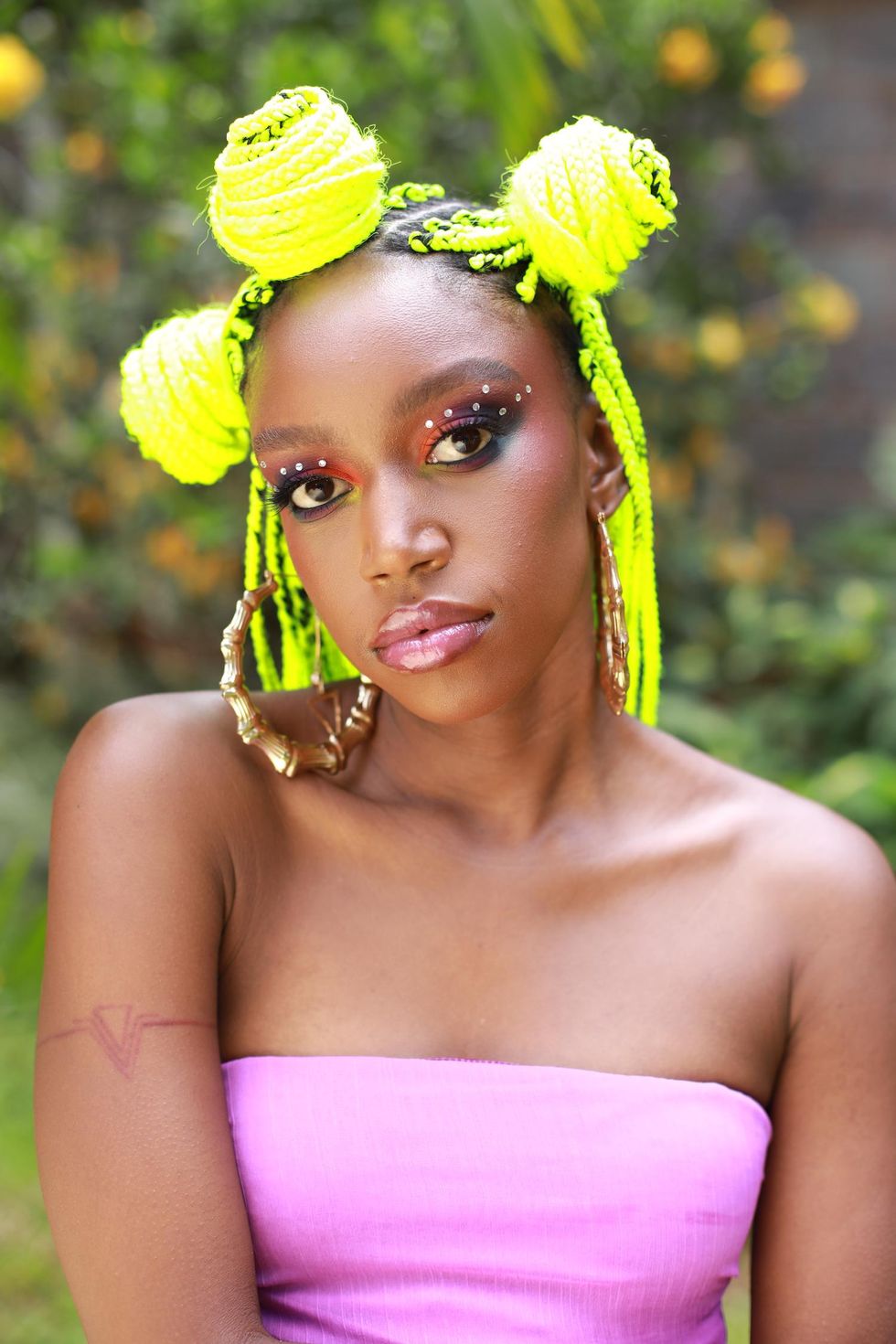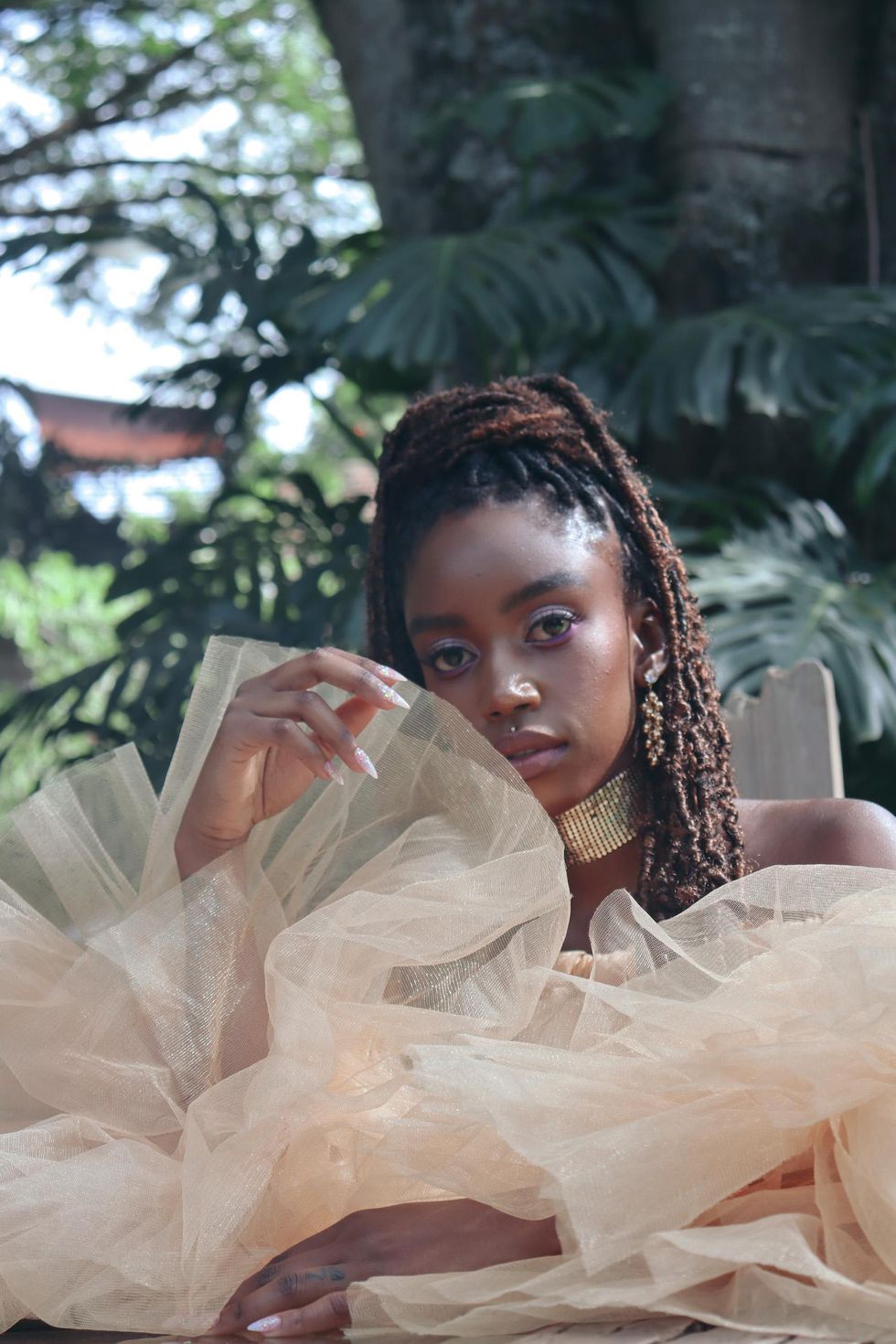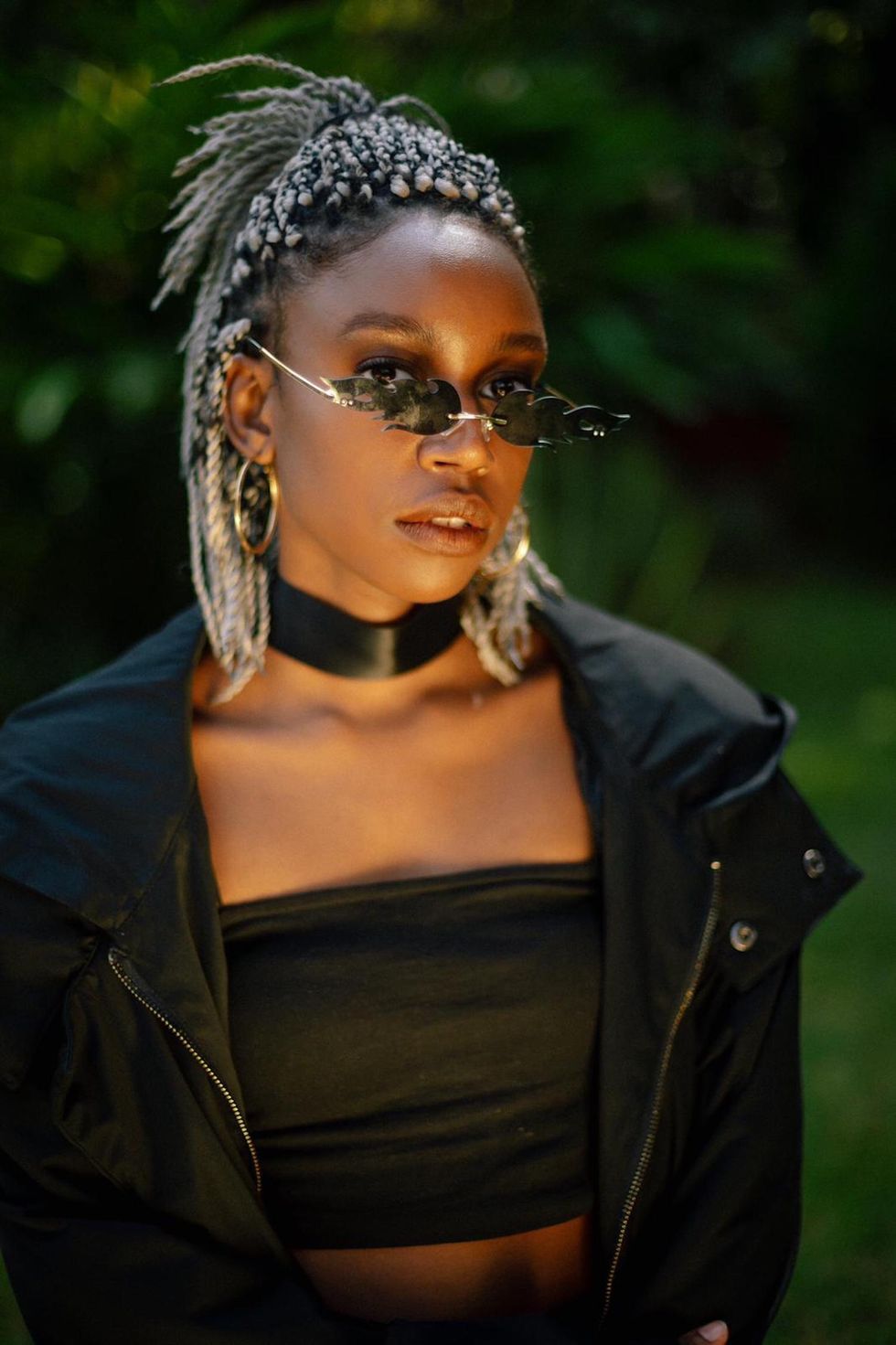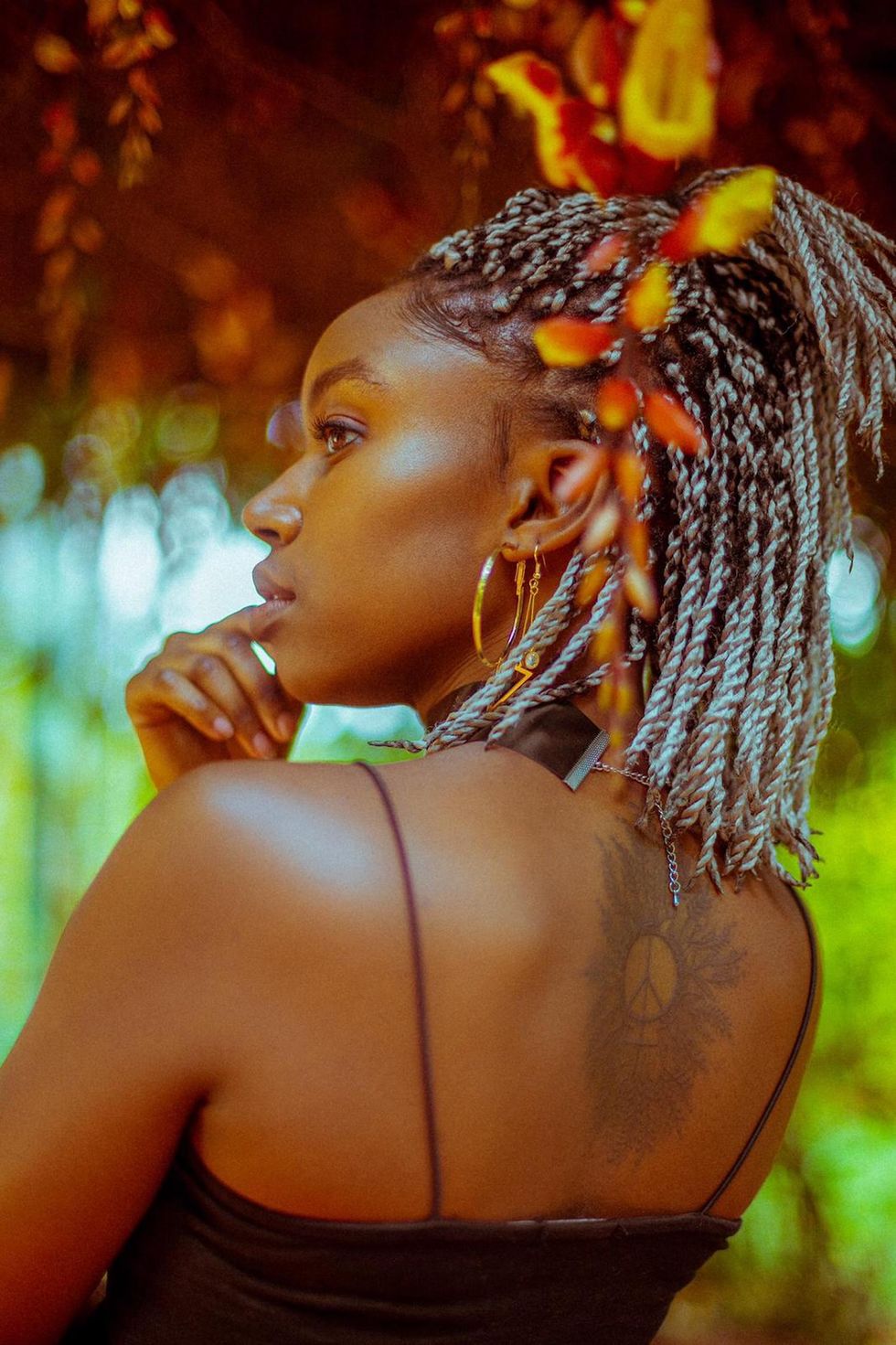Interview: Karun Returns With Intention On 'Catch A Vibe'
The Kenyan musician comes back after motherhood, finding balance and re-alignment in her new EP.

Karun.
"I don't know what to say," Karunresponds after our waiter curiously states that she looks familiar and she awkwardly laughs it off. The Berklee College of Music graduate is not new to being in the public eye, but her introverted demeanour would lead you to think otherwise. Karun, to those closest to her, has been singing her entire life; the rest of us were introduced to her through Camp Mulla, the BET-nominated pop group she was a member of in her teens.
As we discuss the journey to her new EP, Catch A Vibe, one begins to understand the transformative growth that comes for anyone in their 20s and how as an artist there are many questions around which road one should take. For Karun a real question was quitting and leaving music behind. Through these internal battles she ended up creating Catch A Vibe, a public service announcement that she's back doing what she's meant to. We are re-introduced to an artist that is making music she wants on her own terms.
Below we talk to Karun about how her definition of success has changed, the lessons that influenced her latest EP and the importance of balance and mental health.
This interview has been edited and condensed for clarity.

How has your definition of success changed?
I don't think I used to think about success that much when I was first in the industry and then somewhere along the line, you get this idea that you need awards, you need to be featured, so if that doesn't happen, you kind of feel like you're doing something wrong. But then towards the end of last year, I went away to the mountains and realized that I had taken on all these perceptions and they weren't even mine. I was like, actually, I don't even care about any of these things. Around New Year's, I just let go of a lot of things and redefined what made me. I put together a whole list of what makes me happy, what I what's really important in my life, what my values are and I realized that it's super simple. I just want to spend time with my son, I want to be able to be creative and I want to have flexibility and mental health.
"I went away to the mountains and realized that I had taken on all these perceptions and they weren't even mine."
Was there a point where you took a break to reach this stage?
No, I didn't really have the luxury because the project was coming out. I felt like I needed to quit. I was even telling myself "after this I'm quitting—done" because I felt like I needed space to grow into that. But sometimes life doesn't give you that space. So I just turned to meditation and being more present and realizing that you do have time, like every day is a chance to grow. You don't need to run away.
You share your reflections in your music, is there sort of a balance between what you do or don't share with the world?
My mom is like "you're too honest and everyone knows everything" but I don't think about it too much in terms of my music. I think about it more in terms of social media. I think anyone with anxiety or who needs to keep a balance in their mental health has a weird relationship with it.

How has that relationship changed, since social media wasn't the beast it is today compared to when you were in Camp Mulla?
You have this pressure to be consistent on social media but at the same time, you need time away from the world in order to be honest in your music. I feel like I look around and I'm like, "where are the real artists?" Think about like van Gogh, back in that era, I feel like people found it okay if they were crazy or just didn't conform to what you're supposed to behave like in the normal world because you're an artist, right? And I feel like people don't have that luxury anymore because of social media. So you have to be perfect and I feel like that can take away from what it means to be an artist.
How did the new EP Catch A Vibe come about?
I started working on this current music halfway through 2019 and I didn't know that I wanted to make an EP, but I knew I wanted it to be a fun process. I wanted it to be light hearted and I didn't want to take anything too seriously, because I had taken things very seriously before. The process was very intentional this time.
"You do have time... every day is a chance to grow. You don't need to run away."
What were the challenges you faced that made everything so serious?
I think it was the challenge of being a mom—being a young mom and being labelled a young mom. I was 23, my parents' generation were having kids at that age all the time. It was very confusing to be an adult but also a young mom. So I felt the pressure that whatever I'm doing, it has to succeed. It has to bring back money, I have to be able to support my son. It can't be something that takes away from my parenting.

You sing "No one ever taught me how to grind" on the EP, what were some of the lessons that you've learned through that process of balancing things.
Figuring out what's important to me and what I truly care about has really helped me because you can spend a lot of energy trying to do what you feel like you're supposed to do to get ahead or make money or what you think you're supposed to do as a parent. If it's not in line with who you really are it's not sustainable and that can lead to burnout. I don't think it's helpful to grind and burnout, you have to be balanced if you're going to grind. That's a lesson I had to learn on my own, it's pretty hard to be taught that.
This EP is also an ode to your fans, tell me about the relationship you have with them.
I made a bunch of music in 2018 that didn't come out and I feel like the fans knew that music existed and I felt like I let them down by not releasing it. This time, I was like this is not even about me, I want to have music for my fans, they are still around, they're still supporting me and come to my shows. I really owe them because I have self-doubts and I wouldn't still be doing this if it wasn't for them. I sometimes say "letting go propels you forward" and that is how I felt about letting go of that music, letting go of the drama that surrounded it and just launching into making this project.

You speak of self-doubt, do you feel like you're starting over again or re-introducing yourself?
It's weird because I never stopped. It just feels like everything I did prior was me growing into myself, and allowing myself to experiment with different sides of myself so that I know what I really want. We started out as a 'pop' group but I never saw myself as a pop artist, I saw myself as a musician. A lot of compositions that I made for myself before that were very influenced by classical music and traditional African music from around the continent. So when I left Camp Mulla, I was like I really have to explore different areas and through all that, I realized that I do actually like pop, I just didn't like that the label was imposed on me. Now I feel like I get to come back and reinvent what that means for me.
What excites you?
I like the possibility of just sitting in my room making music and feeling like it's dope. I feel like I immediately know that it can go somewhere and people will appreciate it, which is not the same feeling I get when I make music in America because I feel like it's so saturated. I just get the feeling that in Kenya, there's also less expectation and so we experiment, if that makes sense. I think it's a special time. Muthoni Drummer Queen kind of predicted this. I was going to quit before I did her incubator program, and she was like "you can't quit now! You don't know the next five years are going to be lit" and I was like, "sure, whatever."
I get excited seeing anybody winning—like Valerie Muthoni is doing her thing, Blinky [Bill] is doing his thing. There was a time where Barak Jacuzzi would be in the studio, in parallel rooms and it would be like, "Oh, you're making a hit. I'm gonna make-" you know, it's like healthy competition and support and I was really motivated by that kind of energy. Xenia is doing her thing. I'm also inspired by the female rappers that are coming up right now and the R&B scene with Maya Amolo. So it's like the fact that these are people in so many different pockets, and they're just doing their thing is what excites me.
- The 6 Best East African Songs of the Month - OkayAfrica ›
- Op-Ed: It's Time For Kenya to Get More Respect As an African Music ... ›
- Photos From the Birth of Kenya's New Hip-Hop Scene - OkayAfrica ›
- Mr Eazi Reveals Artists Recruited Onto emPawa Africa Program ... ›
- The 8 Best East African Songs of the Month - OkayAfrica ›
- Kenyan Rapper Wangechi Returns From Tragic Car Accident With ... ›
- East African Wave: 5 Young Kenyan Producers are Creating the ... ›

